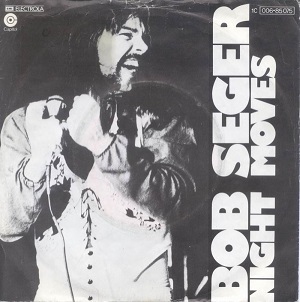Related Research Articles

A Bayer designation is a stellar designation in which a specific star is identified by a Greek or Latin letter followed by the genitive form of its parent constellation's Latin name. The original list of Bayer designations contained 1,564 stars. The brighter stars were assigned their first systematic names by the German astronomer Johann Bayer in 1603, in his star atlas Uranometria. Bayer catalogued only a few stars too far south to be seen from Germany, but later astronomers supplemented Bayer's catalog with entries for southern constellations.

Robert Clark Seger is an American singer, songwriter, and musician. As a locally successful Detroit-area artist, he performed and recorded with the groups Bob Seger and the Last Heard and the Bob Seger System throughout the 1960s, breaking through with his first album, Ramblin' Gamblin' Man in 1969. By the early 1970s, he had dropped the 'System' from his recordings and continued to strive for broader success with various other bands. In 1973, he put together the Silver Bullet Band, with a group of Detroit-area musicians, with whom he became most successful on the national level with the album Live Bullet (1976), recorded live with the Silver Bullet Band in 1975 at Cobo Hall in Detroit, Michigan. In 1976, he achieved a national breakout with the studio album Night Moves. On his studio albums, he also worked extensively with the Alabama-based Muscle Shoals Rhythm Section, which appeared on several of Seger's best-selling singles and albums.

Charles Dillon Perrine was an American astronomer at the Lick Observatory in California (1893-1909) who moved to Cordoba, Argentina to accept the position of Director of the Argentine National Observatory (1909-1936). The Cordoba Observatory under Perrine's direction made the first attempts to prove Einstein's theory of relativity by astronomical observation of the deflection of starlight near the Sun during the solar eclipse of October 10, 1912 in Cristina (Brazil), and the solar eclipse of August 21, 1914 at Feodosia, Crimea, Russian Empire. Rain in 1912 and clouds in 1914 prevented results.

Carl Ernst Albrecht Hartwig was a German astronomer.
Heartland rock is a genre of rock music characterized by a straightforward, often roots musical style, often with a focus on blue-collar workers, and a conviction that rock music has a social or communal purpose beyond just entertainment.

Drew Abbott is an American guitarist, who is best known for playing in Bob Seger's Silver Bullet Band, and appears on Bob Seger's Seven (1974), Beautiful Loser (1975), Live Bullet (1976), Night Moves (1976), Stranger in Town (1978), Against the Wind (1980), Nine Tonight (1981), and The Distance (1982).

"Night Moves" is a song by American singer-songwriter Bob Seger. It was the lead single from his ninth studio album of the same name (1976), which was released on Capitol Records. Seger wrote the song as a coming of age tale about adolescent love and adult memory of it. It was based on Seger's teenage love affair, which he experienced in the early 1960s. It took him six months to write and was recorded quickly at Nimbus Nine Studios in Toronto, Ontario, with producer Jack Richardson. As much of Seger's Silver Bullet Band had returned home by this point, the song was recorded with several local session musicians.

Krisztián Sárneczky is a Hungarian teacher of geography and prolific discoverer of minor planets and supernovae, researching at Konkoly Observatory in Budapest, Hungary. He is a board member of the Hungarian Astronomical Association (HAA) and member of the American Association of Variable Star Observers, leader of the Comet Section of the HAA, and is a contributor in the editorial work of Hungarian Astronomical Almanach.

Sara Caroline Seger is a Swedish footballer who plays as a midfielder and club captain for Damallsvenskan club FC Rosengård. She was the long-standing captain of the Swedish national football team until she announced her retirement from international football in December 2023. At 240 caps, Seger is the most capped player in Europe, male or female.

"Like a Rock" is a song written by American singer-songwriter Bob Seger. The single peaked at No. 1 on the US Album Rock Tracks chart.

"Old Time Rock and Roll" is a song written by George Jackson and Thomas E. Jones III, with uncredited lyrics by Bob Seger. It was recorded by Seger for his tenth studio album Stranger in Town. It was also released as a single in 1979. It is a sentimentalized look back at the music of the original rock 'n' roll era and has often been referenced as Seger's favorite song. The song gained renewed popularity after being featured in the 1983 film Risky Business. It has since become a standard in popular music and was ranked number two on the Amusement & Music Operators Association's survey of the Top 40 Jukebox Singles of All Time in 1996. It was also listed as one of the Songs of the Century in 2001 and ranked No. 100 in the American Film Institute's 100 Years...100 Songs poll in 2004 of the top songs in American cinema.

Qāḍī Zāda al-Rūmī, whose actual name was Salah al-Din Musa Pasha, was a Turkish astronomer and mathematician who worked at the observatory in Samarkand. He computed sin 1° to an accuracy of 10−12.
The discography of Bob Seger, an American rock artist, includes 18 studio albums, two live albums, five compilation albums and more than 60 singles. Bob Seger's albums have sold over 50 million copies and received seven multi-platinum, four Platinum and two Gold certifications by the RIAA.

Foreign relations between Argentina and Germany have existed over a century. The free city-state of Hamburg was the first German state to establish diplomatic relations with Argentina in 1829. The first ambassador of Germany to Argentina was sent on 7 May 1871.
Paul Harris was an American keyboard player, multi-instrumentalist and arranger.

"Mainstreet" is a song written and recorded by Bob Seger & The Silver Bullet Band. It was released in April 1977 as the second single from the album Night Moves. The song peaked at number 24 on the U.S. Billboard Hot 100 and has become a staple of classic rock radio; it also reached number one on the Canadian Singles Chart.

"Hollywood Nights" is a song written and recorded by American rock artist Bob Seger. It was released in 1978 as the second single from his album, Stranger in Town.
Segers is a Dutch patronymic surname. The mostly archaic Dutch given names Seger, Segher, Sieger and Zegher derive from Germanic Sigi- and -her, meaning "victorious lord". People with the surname Segers include

"Still the Same" is a 1978 song written and recorded by the American singer Bob Seger. It hit #4 on the U.S. Billboard Hot 100 chart and was an international hit.

There is a community of Americans living in Argentina consisting of immigrants and expatriates from the United States as well as their local born descendants. There are roughly 5,000 or 60,000 Americans living in the country.
References
- Menzel, D. H.; Minnaert, M.; Levin, B.; Dollfus, A.; Bell, B. (1971). "Report on Lunar Nomenclature by The Working Group of Commission 17 of the IAU". Space Science Reviews. 12 (2): 136. Bibcode:1971SSRv...12..136M. doi:10.1007/BF00171763. S2CID 122125855.